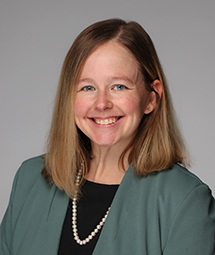Foundation Award for Teaching

Nichole Busdieker-Jesse
School of Hospitality and Agricultural Leadership
Darr College of Agriculture
I. Philosophy of Teaching
The core of my philosophy of teaching is learning by doing and doing to serve, which takes education outside the classroom into a realm of application that goes beyond the student. These principles are not new to agricultural students, but a continuation of efforts that start long before they walk into my classroom. Working with students who have a passion for an industry built on serving others allows us to do more and be more for them. I take course theory and work towards real world applications such as analyzing business financials, creating business plans students can put into action and serving others while addressing food insecurity. These applications and others are strengthened by class discussions and industry experts brought to campus to create a well-rounded classroom experience. Education is a two-way street. Students must be willing to do the work, but so must I. I believe it is my responsibility to serve my students through course content, career development, academic advising, student organization mentoring and being a faculty member they can count on. I continually strive to balance these opportunities with other student needs to serve them better and further develop myself as a faculty member.
II. Examples of Courses/Topics
Many of the topics that I cover in my classes focus on business in agriculture. From Farm Business Management (AGB 584) to Agricultural Entrepreneurship (AGB 594) and from Introduction to Agricultural Risk Management (AGB 364) to Advanced Agricultural Risk Management (AGB 574). Other courses I teach include topics important to anyone wanting to work in or work with those in agriculture such as Agricultural Law (AGB 314) and American Agricultural Policy (AGB 444). I have been fortunate enough to expand my teaching into the area of General Education through teaching AGR 100 Food Security, where we combine service learning and helping students to understand the complexities of addressing food insecurity in their local communities, state, nation and across the globe. I also am able to serve the students through the Agricultural Industry Study course where we take junior and seniors to the businesses themselves to explore the basics of the businesses, see what job opportunities are out there and help them to network with others across the state. We travel to Kansas City or St. Louis in the January offering and include rural towns in central Missouri when we offer in the Summer. I have offered most of these courses in various modalities and some at the graduate level throughout my time at Missouri State.
III. Future Projects
I am currently wrapping up my time as PI for a USDA National Institute of Food and Agriculture Building Capacity grant that focused on the Challenges that Beginning Farmers face. This has been a great opportunity to expand course content while helping those working in our industry. I hope to continue research in this area to build on results and tools discovered so far. My aim is to incorporate more risk management studies into this research to support other courses I teach. One area of interest to me regarding risk management is diversification and a relevant and growing area of interest in agricultural diversification is agritourism. Working with others in our school, there are a lot of opportunities in this area going forward.
Beyond research my aim is to further incorporate service-learning opportunities beyond the 100 level in the Darr College of Agriculture and the University. I worked with others to successfully incorporate it at the capstone level in agricultural business, but I feel even that integration can improve. Through building relationships with community partners, we will be able to secure the best experience for our students throughout their time at MSU.
IV. Topics related to teaching and of interest to the University Community, for which you are available for presentations and/or consultations (e.g., presentation tools, special topics, technology, public affairs).
Experiential Learning; service-learning and community engagement in the classroom; agricultural business and communications applications, food system challenges; food and agricultural policy topics; risk management and the business of food production; beginning farmer and established farmer challenges.